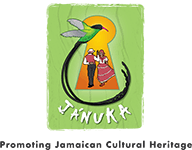BACKGROUND INFORMATION (contd) The Significance of Anancy Stories
I have fond memories of growing up in Jamaica and can recall hearing Anansi stories at home, school, on the radio, and at community gatherings. This was common place entertainment by elders and entertainers. We loved the character of Anancy the trickster. The way he spoke in a high pitched voice with lisp tongue was comical. We even tried to make up our own stories as children, based on their unusual names, eg, Brother Tukuma. The stories always made us laugh, but as children, did we really understand the true significance of these stories to real life situations? Certainly not!
During my investigation, one Elder said to me “The telling of Anancy stories was not just for entertainment when he was growing up. Anancy stories were also educational, because they teach us to be always aware of tricksters. The first trickster to be aware of is the trickster within yourself. You have to develop control to overcome evil acts because a “trickster”is a person who cheats and deceives people…Beware of the trickster”
Because we wanted to include Anancy stories in our programme, the significance was further explored in the literature.

TABLE 4: THE SIGNIFICANCE OF ANANCY STORIES
| The word “Anancy”/ “Anansi” is derived from Twi, a West African language. The telling of Anansi stories was part of the tradition of African villages where everyone gathered around a fire at night to hear the old tales. The displaced Africans brought their story telling tradition to Jamaica/ Caribbean.
In Jamaica, Anansi stories were frequently told to children usually at bed-time. Adults also told Anansi stories at Wakes and moonlight gatherings to entertain themselves. Anansi is depicted as a trickster hero. He is portrayed as a short, small and greedy spider with human qualities and characteristics. Anansi survives by “working his brains” i.e. by his cunningness, helped by his glibness of speech, despite his “tie- tongue” and a falsetto voice. Anansi personifies the qualities of survival and the triumph of the weak over the strong. These are attribute that our enslaved ancestors’ could have found uplifting and empowering. Stories always end with the words “Jack Mandora mi noh choose none” Although the origin is uncertain it is supposed to mean that the teller does not approve of Anansi’s tricks. Anansi stories are preserved through literature and on the stage, most notably Sir Phillip Sherlock and Louise Bennett. |
References:
Bennett L (1966) Jamaica Labrish. Sangster’s Book Stores Limited, Kingston. Jamaica
Bennett L (1979) Anancy and Miss Lou.. Sangster’s Book Stores Limited, Kingston. Jamaica
Zaul Peter-Paul 92003) Anancy Mek it . LMH Publishing Ltd. Kingston. Jamaica
From: Beverley Bogle – Group Coordinator




